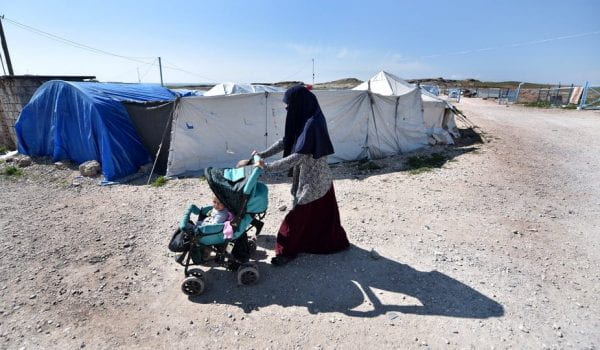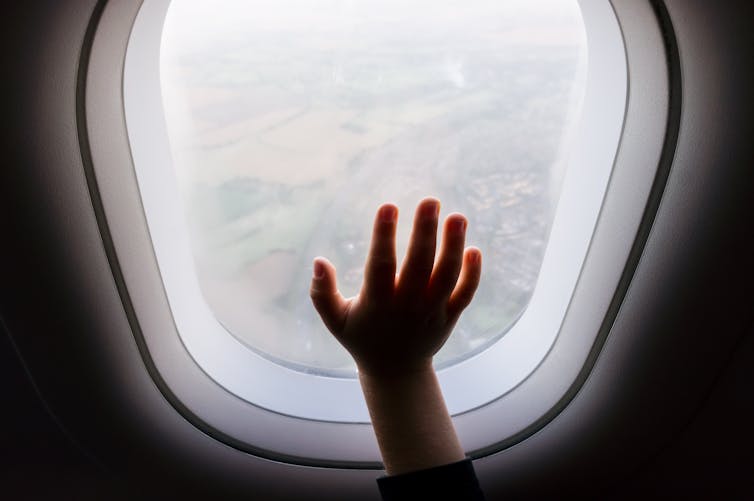Authors:
: Reader in Law, University of Bristol
Lecturer in Criminology, Monash University
Post-Doctoral Researcher in Terrorism, Counter-Terrorism and International Law, T.M.C. Asser Institute
Many thousands of children of foreign Islamic State fighters travelled with them to conflict areas such as Syria and Iraq, or were born there. Now these children and their families face considerable legal and logistical challenges. They are unable to access basic services, or return to their countries of origin, especially if an adult in the family has been deprived of citizenship.
With many countries refusing or delaying efforts to repatriate, these children are in a particularly precarious situation.
An ongoing Dutch case, brought on behalf of 23 women and 56 children by a team of lawyers, shines a probing light on these issues. The central question of whether or not the decision to repatriate is a political choice will be watched closely by other countries.

A woman identified as a Dutch national with her children in a camp in north-eastern Syria in February 2019. Murtaja Lateef/EPA
Repatriation bid
The advocaat-generaal, Lodewijk Valk, who provides independent advice to the Dutch Supreme Court, advised the court in April that the Netherlands does not have to repatriate the Dutch women and children detained in northern Syria. The group is seeking collective repatriation as the children are not allowed to travel away from the region without adults.
In November 2019, the Court of The Hague initially ruled that the state should “make every effort” to allow repatriation of children. The conditions the children were living in were described as “appalling”. The judge went as far as to say that the state would be acting in a careless way if there were no active efforts to repatriate them.
This decision was then quickly reversed in ten days by the Appeals Court, which ruled that the group’s repatriation was a “political choice” and not a legally enforceable right. It’s this ruling that Valk now believes should be upheld – and it’s rare for the Dutch Supreme Court not to follow his advice. A final ruling is expected some time in summer 2020.
Valk stressed that the parents’ wrong choices should not be held against the affected children. He also suggested that an assessment of whether to repatriate each of the children should be on a case-by-case basis. He suggested that a request to repatriate the children only might have had a higher likelihood of success. Still, the children are not allowed to travel on their own and assessing the culpability of each mother for alleged activities within another jurisdiction and during a conflict would come with significant complications and long delays.
There are additional complications in this case. Since the legal challenge began in 2019, some of the group have relied on people smugglers to escape the camps and their current whereabouts are unknown.

Repatration now seems unlikely. Dedi Grigoroiu via Shutterstock
Best interests of the child
The key question in this context is what is in the best interests of the affected children. Irrespective of whether a minor left their home voluntarily or was taken to Syria or Iraq by a family member, their home state has a special responsibility to guarantee their safety and wellbeing under the UN Convention on the Rights of the Child. It states that the best interests of the child should be the primary consideration in all actions.
If a state is to comply with its international obligations, children’s rights and wellbeing must not be compromised due to the decisions of adults and their alleged actions. If a child’s mother is alleged to have played an active role in a criminal situation, individual assessments of the criminal conduct or security risks of a parent should not be a reason to delay the repatriation of a child. There are ample opportunities on return to investigate the conduct of the Dutch parents and assess whether they pose a risk of re-offending without affecting the children.
Children’s rights should not be practically enforced based on the “worthiness” of either the parents or the children. It’s paramount that children’s prospective repatriation is not assessed through a national security lens, or on the question of whether or not bringing them home is conducive to the public good. Such an approach assumes, from a distance, that the children have been radicalised and that they may engage in criminal or terrorist activities in an unspecified time in the future.
Some countries such as Australia, Belgium, France and Norway have repatriated a limited number of children of Islamic State fighters. However, the reluctance to bring back children on the part of some European nations such as the Netherlands is likely to influence other countries in their future decisions too.
In light of the well-accepted international principles and obligations towards children, the safe repatriation of Dutch children living in Syria is urgent and it has already been unnecessarily delayed by court proceedings. Every child is deserving enough of legal protection from the country of their citizenship.
This article is republished from The Conversation under a Creative Commons license, Read the original article.
